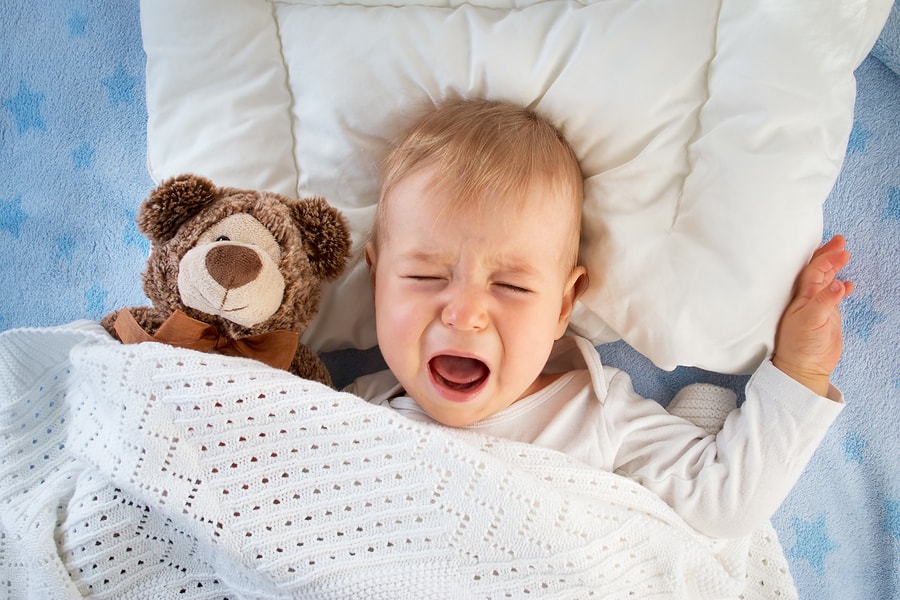Baby has insomnia and restless sleep after recovering from Covid-19, what should parents do?
Many parents have expressed concern about their children’s insomnia after recovering from Covid-19. Some children are older, going to primary or secondary school, but there are also very young children, even only 3-4 months old.
Not long after recovering from Covid-19, Ms. Hong Minh's (30 years old, Cau Giay, Hanoi) 8-month-old son began to have poor appetite, sleep less, and had difficulty falling asleep. In the middle of the night, the baby cried and tossed and turned, making Ms. Minh and her husband very worried.
Ms. Lan Anh's family (27 years old, Dong Da) also encountered a similar situation when their 6-month-old daughter had difficulty sleeping at night, was easily startled and cried, and had a restless sleep. Ms. Lan Anh confided that her baby had recovered from Covid-19 for more than a week now, and played and slept normally during the day, but at night she tossed and turned. "At around 1am, she often woke up crying loudly, and it took a long time to calm her down. Before she got sick, she slept very well and did not fuss all night," Ms. Lan Anh shared.
In today’s groups, many parents are expressing their concerns about their children’s insomnia after recovering from Covid-19. Some children are older, in primary and secondary school; but there are also very young children, even only 3-4 months old, causing great confusion for their families.
Talking to VietNamNet about the above issue, Dr. Truong Huu Khanh, professional consultant of the Infectious Diseases - Neurology Department, Children's Hospital 1, Ho Chi Minh City, Vice President of the Ho Chi Minh City Infectious Diseases Association, said that in fact, not to mention Covid-19 infection, many children, especially young children, often have difficulty sleeping and insomnia due to a number of reasons.
In particular, after a cold or a common illness, some children will have trouble sleeping for a while. Therefore, parents should not worry too much.
“It is normal for very young children, like those a few months old, to have trouble sleeping. It could be because they don’t get enough vitamin D, or it could be because of the way their parents take care of them,” said Dr. Khanh.
For older children who understand, according to doctors, it may be because they hear too much information about Covid-19 from their parents, causing confusion and fear, leading to insomnia. It is also possible that during the quarantine period, children have free time to play and are exposed to electronic devices all day, so it is more difficult to sleep.
Dr. Khanh advises parents to supplement vitamin D to help children sleep better. In addition, they can give them some nerve tonics according to the instructions of medical staff. Pay attention to check factors that can affect the child's sleep such as whether the room is too hot, whether it is noisy, whether the child wears too many clothes when sleeping, etc.
|
| Many children have trouble sleeping after recovering from Covid-19. Illustration photo. |
Pediatrician Nguyen Manh Cuong, a member of the military medical team supporting the care and treatment of F0 at home, suggests some ways for parents to help their children sleep better and more deeply. Specifically:
Keep the bedroom quiet, dark enough, and at the right temperature (27 to 29 degrees Celsius) depending on the age of each child. Comfortable mattress and pillow. Do not overdress or wrap the baby in diapers. You can let your baby listen to soft music before bedtime (usually instrumental music). If your baby is breastfeeding, continue breastfeeding, but do not let your baby drink too much because the risk of choking is high.
Supplement your baby with B vitamins: B3, B6, B12. Massage your baby's neck and shoulders. Let your baby sunbathe early in the morning and provide scientific skin care. Bathe and dry your baby regularly.
Associate Professor Dr. Nguyen Tien Dung, former Head of the Pediatrics Department, Bach Mai Hospital, said that it is impossible to hastily conclude that insomnia in young children is a post-Covid-19 problem. “In older children (from secondary school and above), they can have insomnia and difficulty sleeping due to thinking too much. But children who are too young cannot have insomnia due to stress related to Covid-19,” said the Associate Professor.
According to Associate Professor Dung, insomnia is just a symptom, not a disease. The child may have a disease or a problem that causes this condition. Therefore, if the child has difficulty sleeping, tossing and turning for a long time, parents should take the child to a reputable medical facility with a specialist to examine the child's condition to determine the exact condition.
The Associate Professor also commented that another situation could be that parents are too worried about their children after contracting Covid-19, so they find it harder for them to sleep. “It is difficult to determine exactly, so it is best to take the child to the doctor to confirm whether or not the child has insomnia and what the cause is,” Associate Professor Dung said.
He also recommends that parents should not arbitrarily buy sleeping pills or herbs for their children to take because they may not completely solve the cause and instead endanger the child.


